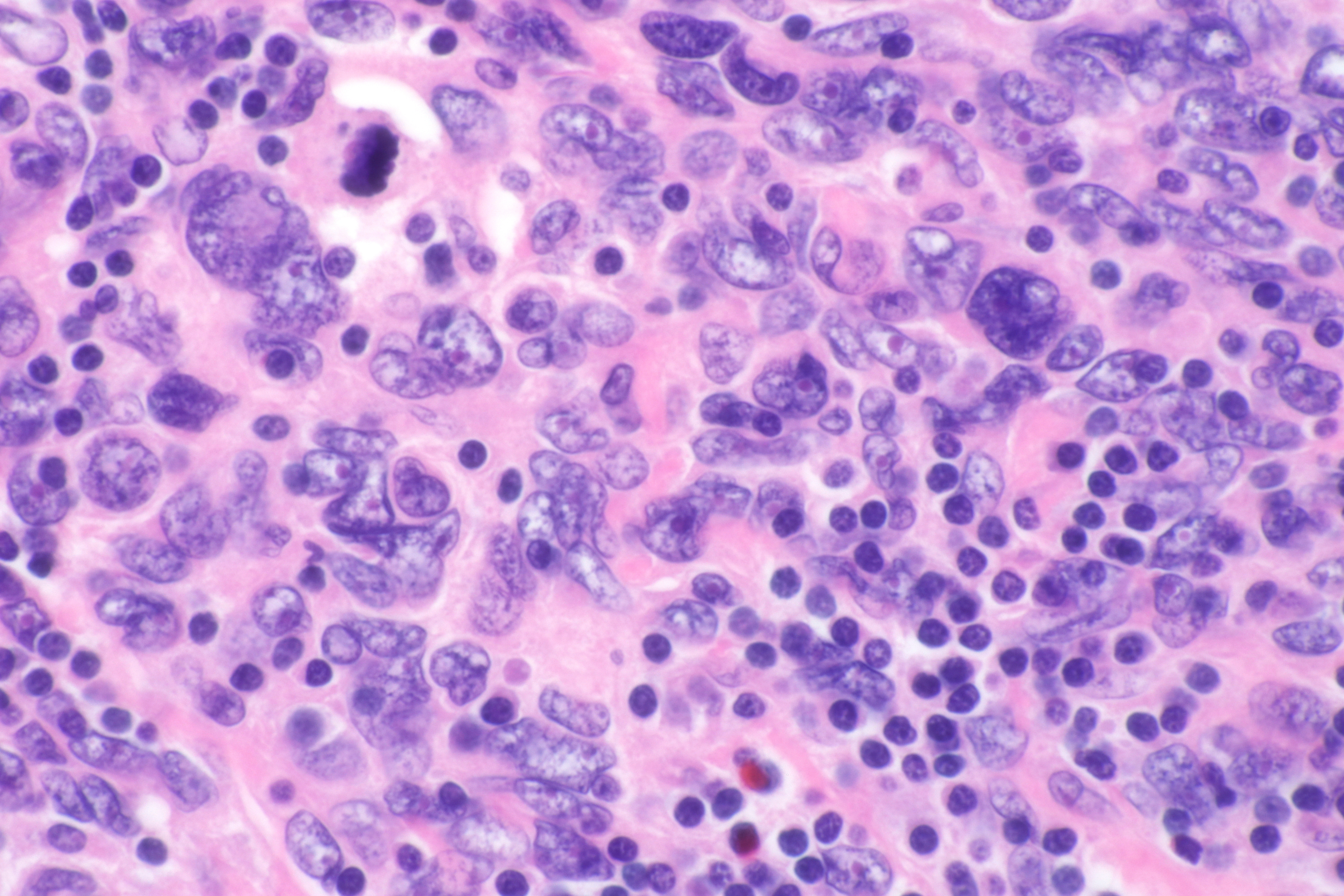Follicular dendritic cell sarcoma
Editor-In-Chief: Prab R Tumpati, MD
Obesity, Sleep & Internal medicine
Founder, WikiMD Wellnesspedia &
W8MD medical weight loss NYC and sleep center NYC
| Follicular dendritic cell sarcoma | |
|---|---|

| |
| Synonyms | N/A |
| Pronounce | N/A |
| Specialty | N/A |
| Symptoms | Lymphadenopathy, fever, weight loss |
| Complications | Metastasis |
| Onset | Middle-aged adults |
| Duration | Variable |
| Types | |
| Causes | Unknown |
| Risks | |
| Diagnosis | Histopathology, immunohistochemistry |
| Differential diagnosis | Lymphoma, carcinoma |
| Prevention | |
| Treatment | Surgery, chemotherapy, radiation therapy |
| Medication | |
| Prognosis | Variable, depends on stage and treatment |
| Frequency | Rare |
| Deaths | N/A |
Follicular dendritic cell sarcoma (FDCS) is a rare type of cancer that originates from follicular dendritic cells, which are cells that play a crucial role in the immune system. These cells are primarily found within the lymph nodes, but they can also be present in other parts of the lymphatic system and beyond. FDCS is considered an intermediate- to high-grade sarcoma and can present significant diagnostic and therapeutic challenges.
Epidemiology[edit | edit source]
Follicular dendritic cell sarcoma is an uncommon malignancy, with a limited number of cases reported in the medical literature. It can occur at any age but is more frequently diagnosed in adults, with a slight predilection for females. The incidence rate of FDCS is not well-defined due to its rarity.
Pathophysiology[edit | edit source]
FDCS arises from follicular dendritic cells, which are integral to the formation of B-cell follicles within lymph nodes and the presentation of antigens to B-cells, facilitating the immune response. The exact cause of FDCS is unknown, but it is believed to involve genetic mutations that lead to the uncontrolled growth of follicular dendritic cells.
Clinical Presentation[edit | edit source]
The clinical presentation of FDCS can vary widely depending on the tumor's location. When occurring in lymph nodes, symptoms may include lymphadenopathy (swollen lymph nodes), which can be painless or associated with discomfort. If the tumor arises in extranodal sites (outside the lymphatic system), symptoms will depend on the organ affected but may include pain, a palpable mass, or specific organ-related symptoms.
Diagnosis[edit | edit source]
Diagnosing FDCS involves a combination of clinical evaluation, imaging studies, and histopathological analysis. Imaging techniques such as CT scans or MRI can help delineate the tumor's size and extent. However, a definitive diagnosis requires a biopsy of the tumor, followed by microscopic examination and immunohistochemical staining to identify the characteristic markers of follicular dendritic cells, such as CD21, CD23, and CD35.
Treatment[edit | edit source]
The treatment of FDCS typically involves surgical resection with the aim of complete removal of the tumor. Given the tumor's potential for recurrence and metastasis, adjuvant therapies, including radiotherapy and chemotherapy, may be considered based on the tumor's size, location, and the patient's overall health. The role of targeted therapy and immunotherapy in treating FDCS is currently under investigation.
Prognosis[edit | edit source]
The prognosis for patients with FDCS varies and depends on several factors, including the tumor's size, location, and whether it has spread (metastasized) at the time of diagnosis. Complete surgical resection offers the best chance for a favorable outcome. However, the disease can recur, and metastatic disease is associated with a poorer prognosis.
Summary[edit | edit source]
Follicular dendritic cell sarcoma is a rare and complex malignancy that poses significant challenges in diagnosis and management. Ongoing research and clinical trials are essential to better understand its pathogenesis and to develop more effective treatments for this disease.
Search WikiMD
Ad.Tired of being Overweight? Try W8MD's NYC physician weight loss.
Semaglutide (Ozempic / Wegovy and Tirzepatide (Mounjaro / Zepbound) available. Call 718 946 5500.
Advertise on WikiMD
|
WikiMD's Wellness Encyclopedia |
| Let Food Be Thy Medicine Medicine Thy Food - Hippocrates |
Translate this page: - East Asian
中文,
日本,
한국어,
South Asian
हिन्दी,
தமிழ்,
తెలుగు,
Urdu,
ಕನ್ನಡ,
Southeast Asian
Indonesian,
Vietnamese,
Thai,
မြန်မာဘာသာ,
বাংলা
European
español,
Deutsch,
français,
Greek,
português do Brasil,
polski,
română,
русский,
Nederlands,
norsk,
svenska,
suomi,
Italian
Middle Eastern & African
عربى,
Turkish,
Persian,
Hebrew,
Afrikaans,
isiZulu,
Kiswahili,
Other
Bulgarian,
Hungarian,
Czech,
Swedish,
മലയാളം,
मराठी,
ਪੰਜਾਬੀ,
ગુજરાતી,
Portuguese,
Ukrainian
Medical Disclaimer: WikiMD is not a substitute for professional medical advice. The information on WikiMD is provided as an information resource only, may be incorrect, outdated or misleading, and is not to be used or relied on for any diagnostic or treatment purposes. Please consult your health care provider before making any healthcare decisions or for guidance about a specific medical condition. WikiMD expressly disclaims responsibility, and shall have no liability, for any damages, loss, injury, or liability whatsoever suffered as a result of your reliance on the information contained in this site. By visiting this site you agree to the foregoing terms and conditions, which may from time to time be changed or supplemented by WikiMD. If you do not agree to the foregoing terms and conditions, you should not enter or use this site. See full disclaimer.
Credits:Most images are courtesy of Wikimedia commons, and templates, categories Wikipedia, licensed under CC BY SA or similar.
Contributors: Prab R. Tumpati, MD

